On December 3, 2024, the 12th China SIF Annual Conference was successfully held in Beijing. The conference was hosted by SynTao Green Finance, with co-hosts from the United Nations Environment Programme Finance Initiative (UNEP FI) and the United Nations Sustainable Stock Exchanges Initiative (UN SSE). Many experts from regulatory bodies, markets, academia, and international organisations have expressed their views and discussed the 20-year development of ESG investment and the opportunities and challenges of responsible investment in China. The event attracted over 300 in-person participants and drew approximately 550,000 online views.
In his opening remarks, Dr. GUO Peiyuan, Chair of China SIF and SynTao Green Finance highlighted the evolution of ESG investment since its inception in 2004 under the UN Global Compact. With ESG now a mainstream concept, sustainable financial assets globally exceed USD 30 trillion. This year’s conference reflected on the journey of ESG over the past two decades while addressing China’s unique green finance landscape and current ESG issues.
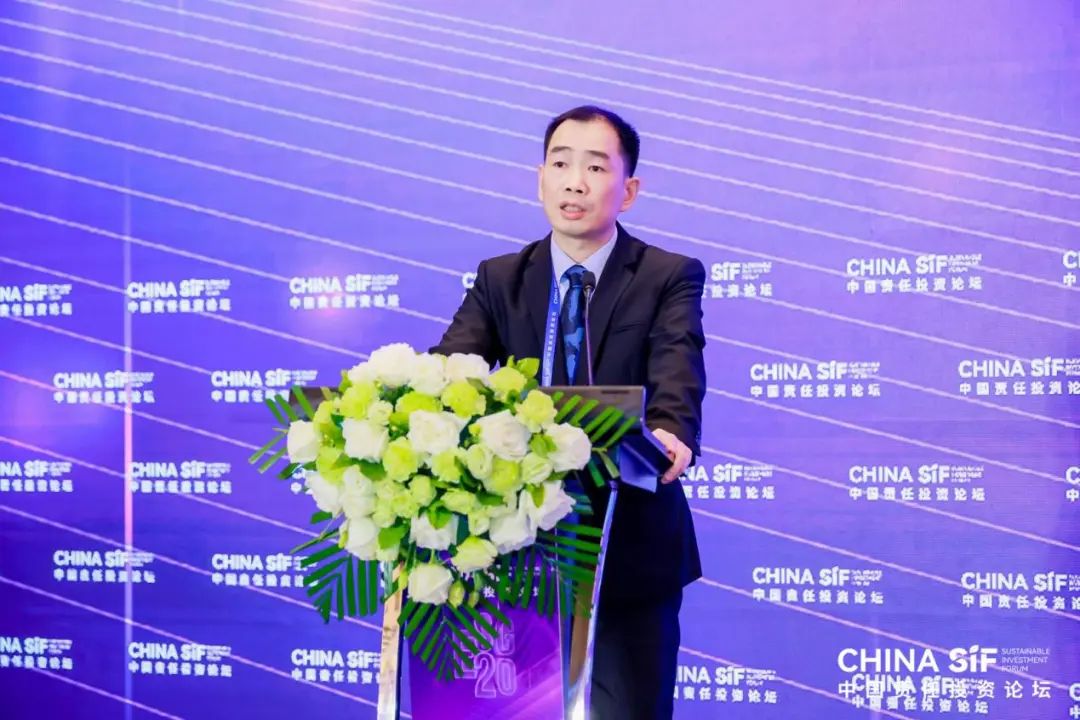
Nan LI COLLINS, Chair of the United Nations Sustainable Stock Exchanges Initiative (UN SSE) and Senior Director of the Division on Investment and Enterprise at the UN Trade and Development (UNCTAD) emphasized that “ESG has evolved from niche discussions to mainstream strategies. Companies that once considered ESG disclosures optional, now see them as essential. Investors who previously focused solely on short-term profits, increasingly recognize the importance of long-term sustainability. As we celebrate key milestones like the establishment of the UN Sustainable Stock Exchange Initiative and the International Sustainability Standards Board (ISSB), we remain committed to tackling pressing global challenges such as climate change and social inequality.” Eric USHER, Head of UNEP FI, noted that Asia has surpassed Europe in terms of assets under management by UNEP FI signatories, underscoring China’s growing influence in sustainable finance.
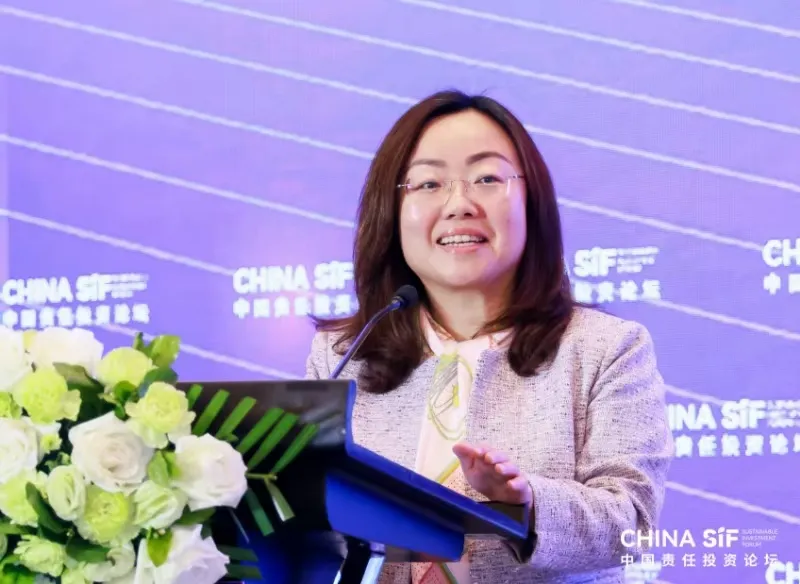
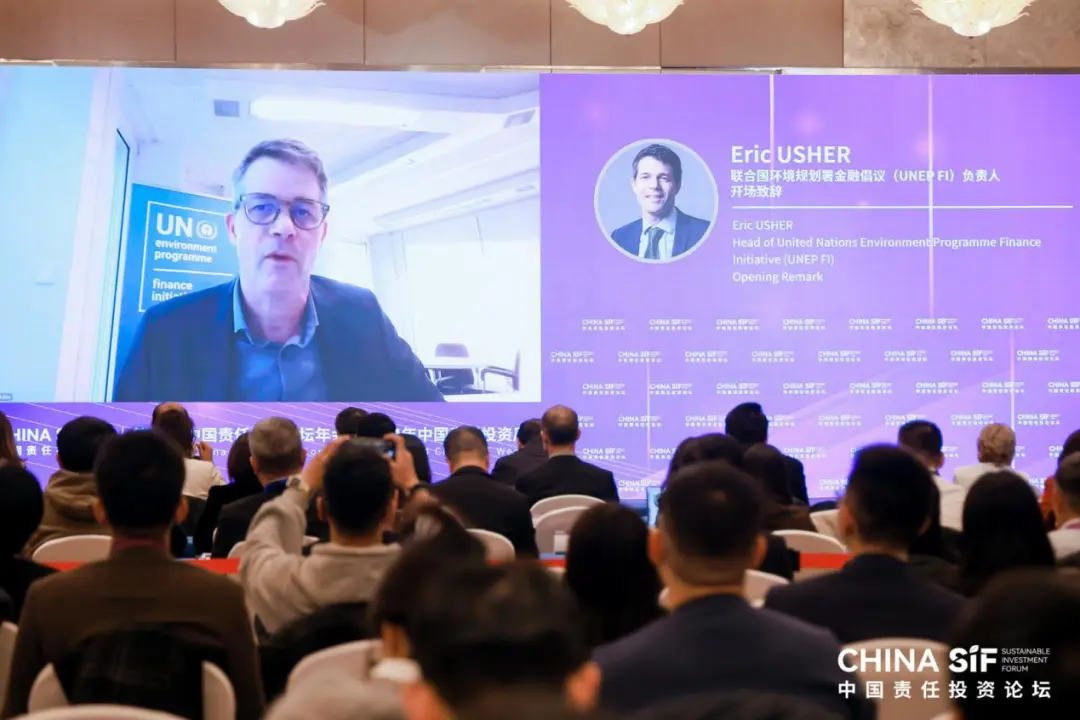
In the first round of keynote speeches, WANG Zhongmin, Former Vice Chairman of the National Council for Social Security Fund and Honorary Chairman of China SIF discussed the transformative potential of AI in ESG, emphasizing its role in data analysis and global standardization. Meanwhile, YI Xuedong, Director at the Research Center, State-owned Assets Supervision and Administration Commission of the State Council (SASAC) detailed how ESG supports high-quality development in state-owned enterprises.
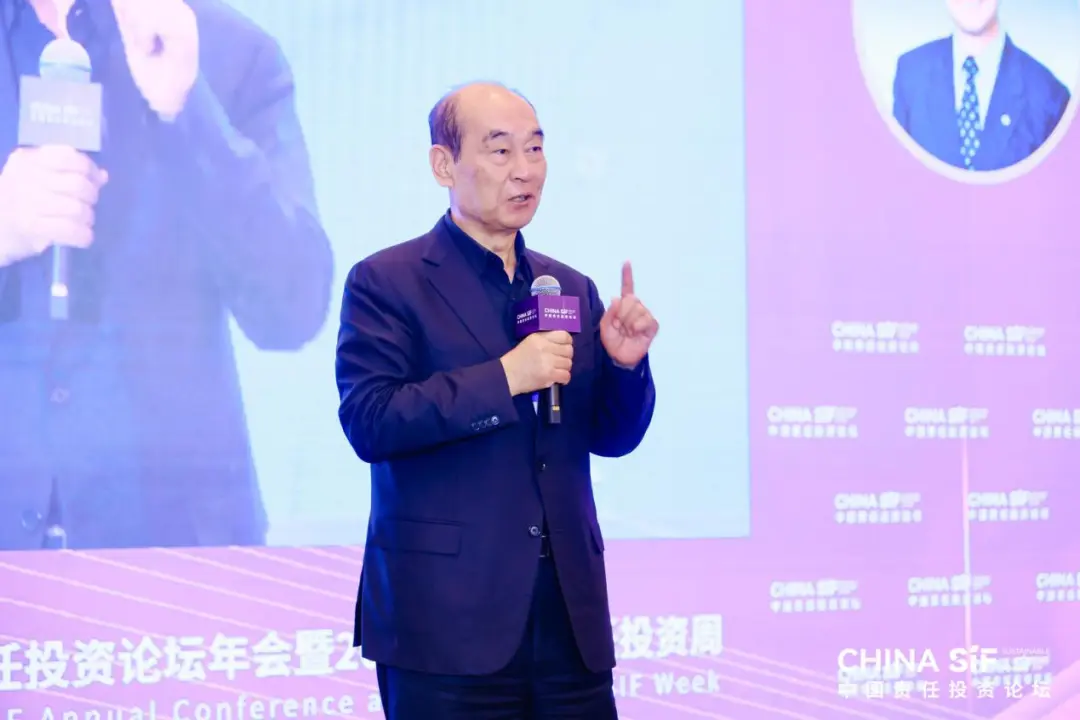
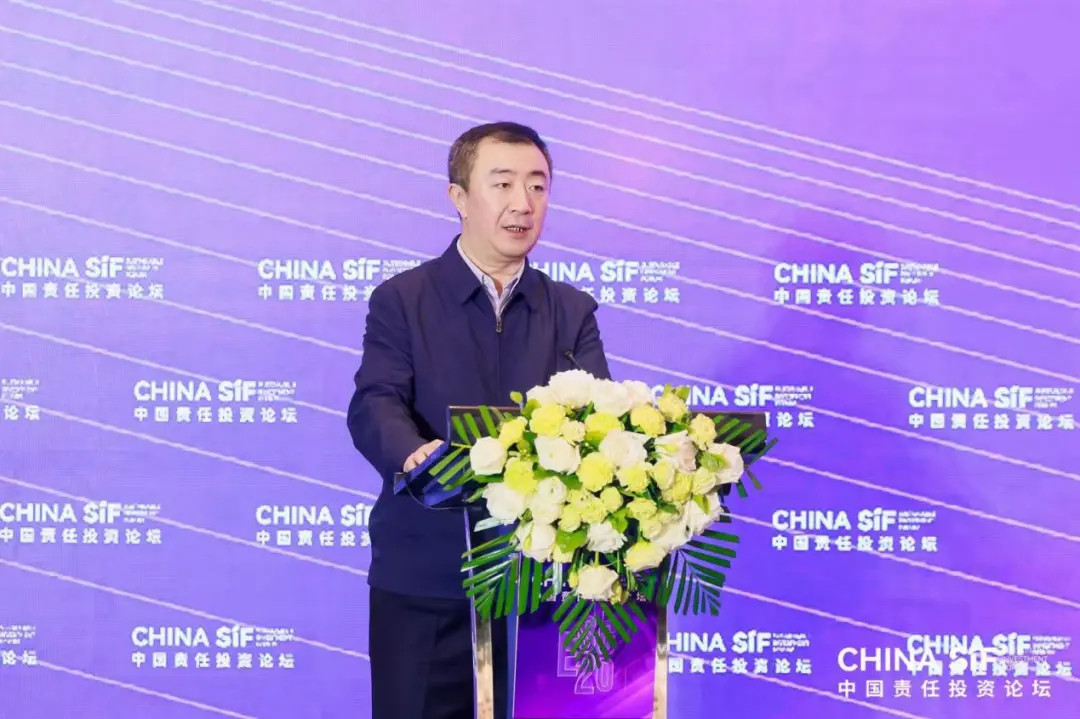
The first round of panel discussion is around policy themes and was moderated by GUO Peiyuan. During the discussion, ZHANG Zhengwei, Special Advisor to the ISSB Chair and Director of the IFRS Beijing Office, noted that the ISSB aims to establish globally unified and comparable sustainability disclosure baseline. Since its inception, the ISSB has developed rapidly. The ISSB has also initiated research on thematic standards for biodiversity, ecosystems and ecosystem services, and human capital. Dr. CHAI Qimin, Director for Strategy and Planning, National Center for Climate Change Strategy and International Cooperation, highlighted that addressing climate change involves core issues such as energy, industry, trade, finance, and technology, making it a central focus within the ESG domain. He stressed that Chinese financial institutions, listed companies, and bond-issuers should prioritize total carbon emissions and intensity performance metrics in their disclosures and responsible investments.
Elaine NG, Associate Director, International Affairs & Sustainable Finance, Securities and Futures Commission of Hong Kong acknowledged that the China SIF conference showcased the all-hands approach and willingness across the financial sector to support the Chinese mainland China's climate and sustainability commitments with its rich content and strong speaker lineup. This is a pivotal moment of immense opportunities from the country’s transition and an exciting time for the Hong Kong financial services sector to participate.

During the first release session, Valentina WU, Director of Research and Development at SynTao Green Finance, presented the China Sustainable Investment Review 2024. She introduced the report which analyzed the development of China’s sustainable investment market from the perspectives of policy progress, market scale, and development trends. Key developments in 2024 include a shift in policies from conceptual to actionable, sustained market growth, and increased breadth and depth in institutional investment practices. However, ESG financial products still require improved ESG integration to gain broader market recognition.
Followed by AN Guojun, Vice Secretary General of the Green Finance Committee and Vice Chairman of China SIF, she introduced the updated version of the Responsible Investment Capability Evaluation (RICE) System. She explained that RICE evaluates the responsible investment capabilities of public funds, insurance asset management, and wealth management firms across six dimensions: strategy, management, products, climate, disclosure, and advocacy. Public funds demonstrated overall better responsible investment capabilities compared to insurance asset management and wealth management firms, although the latter showed the fastest improvement over the past year. Despite significant improvements in scores for all three categories of institutions, none have yet reached the top-tier level, indicating considerable room for growth in responsible investment capability building.
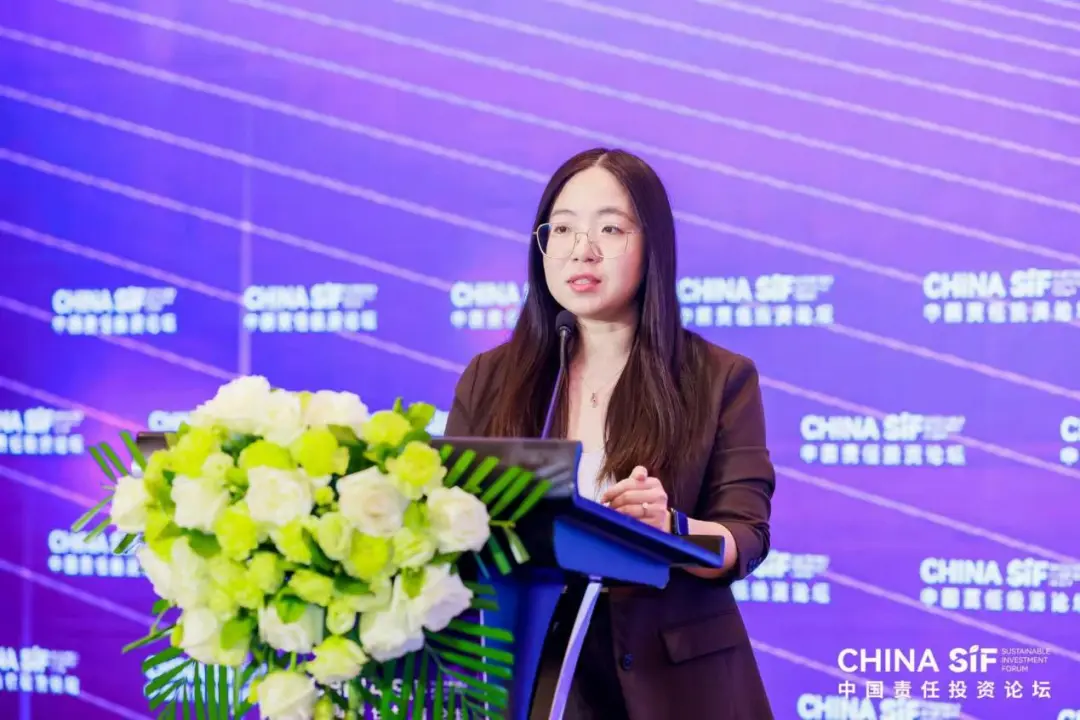
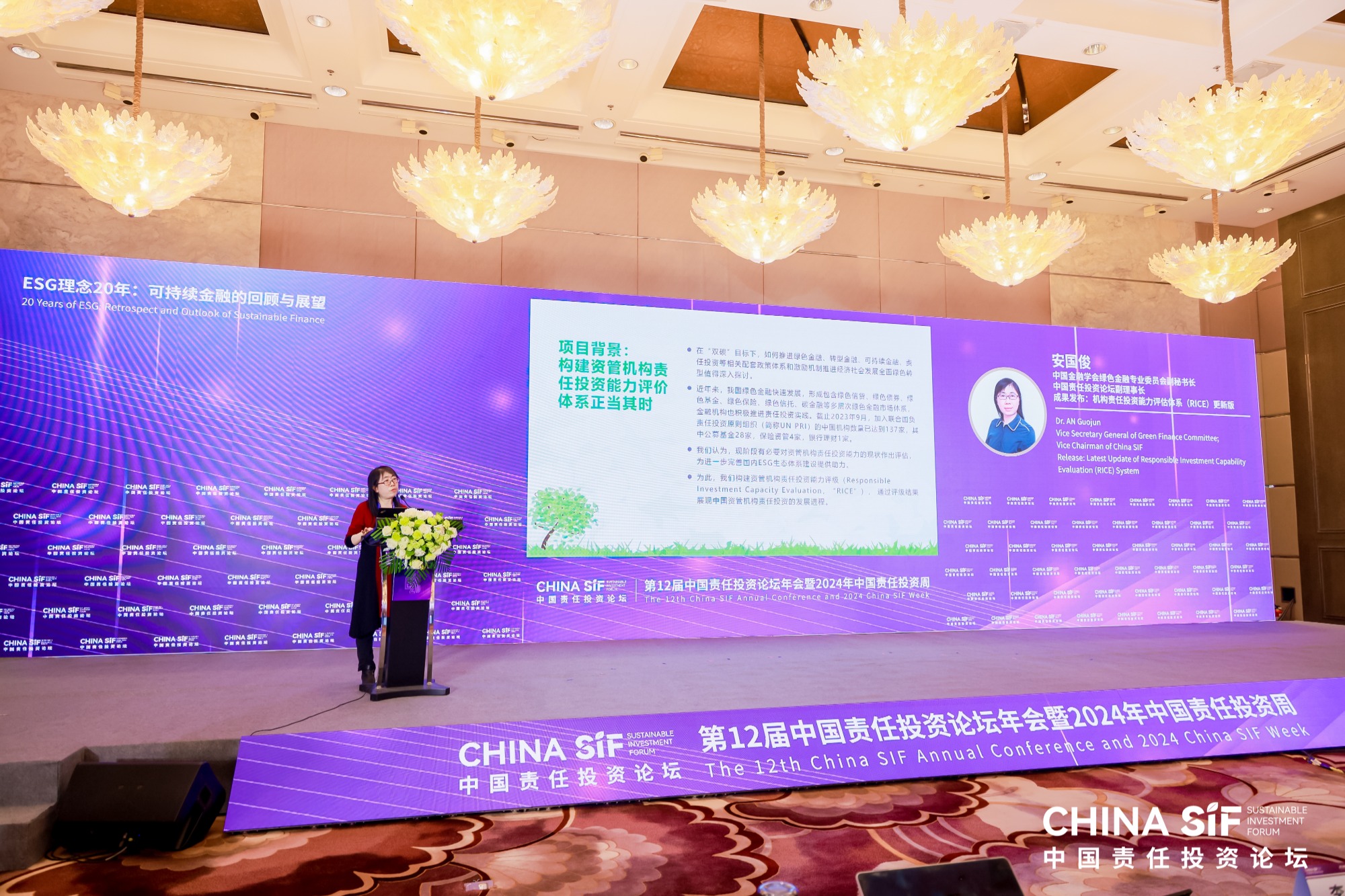
WANG Yida, Chairman of the Supervisory Board of the National Green Development Fund Corporation emphasized in his speech during the second keynote session, that ESG responsible investment has become a major driving force for patient capital. He noted that ESG-driven responsible investment accelerates the development of new productive forces and that China is actively promoting global sustainable finance cooperation and development. However, challenges remain, such as improving the quality of information disclosure, addressing “greenwashing,” and establishing an ESG evaluation system that is both uniquely Chinese and aligned with international standards. He also shared how the National Green Development Fund integrates ESG principles into pre-investment, investment, and post-investment practices, showcasing investment cases in project-based, equity-based, and sub-fund categories that support carbon reduction, pollution control, ecological restoration, and environmental protection.
Fiona REYNOLDS, President of the FAIRR Initiative and former CEO of Principles for Responsible Investment (PRI) shared trends in global ESG development over the past 20 years and detailed how FAIRR helps investors identify ESG risks in the animal protein sector and promote sustainable development in the food sector.

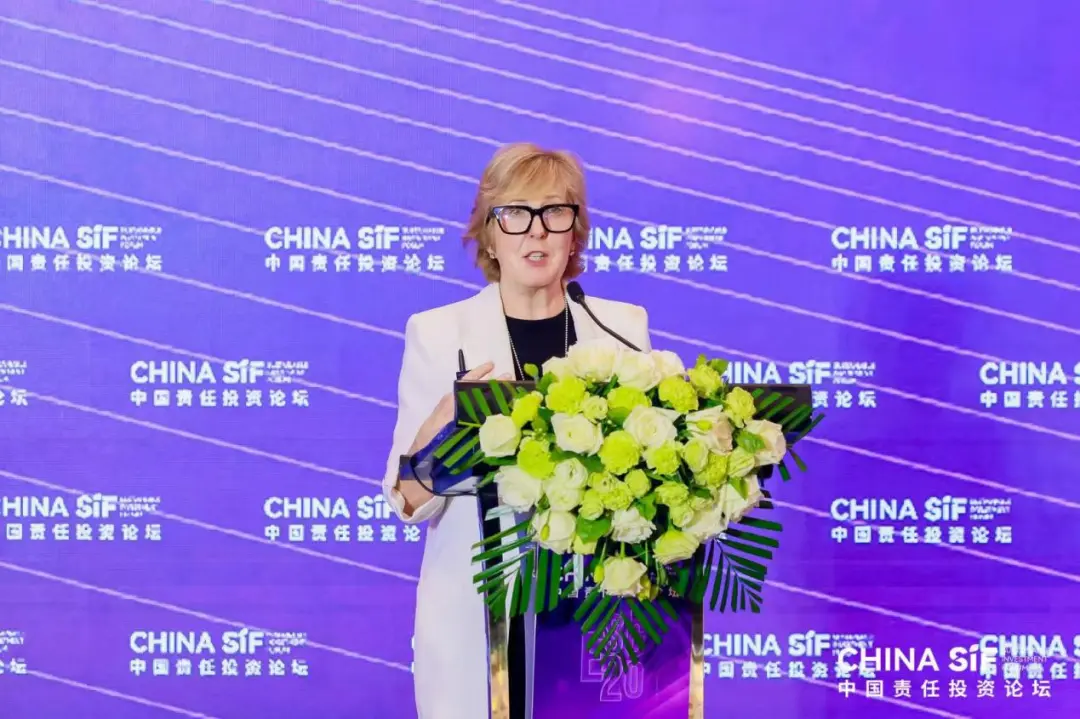
The second round of panel discussion in the morning is around market themes. This session is moderated by Valerie KWAN, Director of Stewardship & Corporate Engagement at the Asia Investor Group on Climate Change (AIGCC). Dr. Esma Nizam ABDUL SAMAD, Senior Vice President of Governance, Risk, and Compliance and Head of the Governance and Corporate Risk Unit at Khazanah Nasional Berhad highlighted in his talk that climate change impacts are not homogenous, underscoring the need to recognise complex vulnerabilities that encompass cultural, historical, socioeconomic, and political contexts when developing adaptation plans. This requires a collaborative, co-learning approach with local communities to create comprehensive climate adaptation policies. Achieving the whole-of-nation objective and the intended global outcomes will require significant time, engagement, and resources from various parties. Dr. Roman NOVOZHILOV, Head of ESG, New Development Bank (NDB) mentioned that ESG and sustainable finance had evolved in the past twenty years from being a unique niche approach by multilateral development banks, such as the New Development Bank, into a wide range of strategies used by a diverse range of investors and issuers. A rapid development of ESG and sustainable finance in China is facilitated by supportive regulatory frameworks and increasing interest by local investors. While China has become a world leader in some aspects of sustainable finance and is aiming to converge its sustainability frameworks with international standards, sustainable finance in China also reflect unique country characteristics thus enriching international sustainable finance practices. Ricco ZHANG, Senior Director, Asia Pacific, International Capital Market Association (ICMA), stated in his sharing, that it will highly rely on the transition finance, especially for the hard-to-abate sectors to achieve the carbon neutrality goals. Nicky DANG, Senior Vice President, Credit Strategy and Research, Moody's Ratings was also a panelist and she said that mandatory climate disclosure will increase compliance costs but can help Chinese companies strengthen risk management practices and maintain access to international markets. Valerie concluded this panel session by saying that she found the interaction with panelists had been the most insightful. The opportunity to take a brief moment to reflect on the tremendous progress in ESG from a time when it was a concept to stay relevant to now having seen the conversation transcend into a strategic imperative both from an investment risk and opportunities perspective is a rewarding experience.
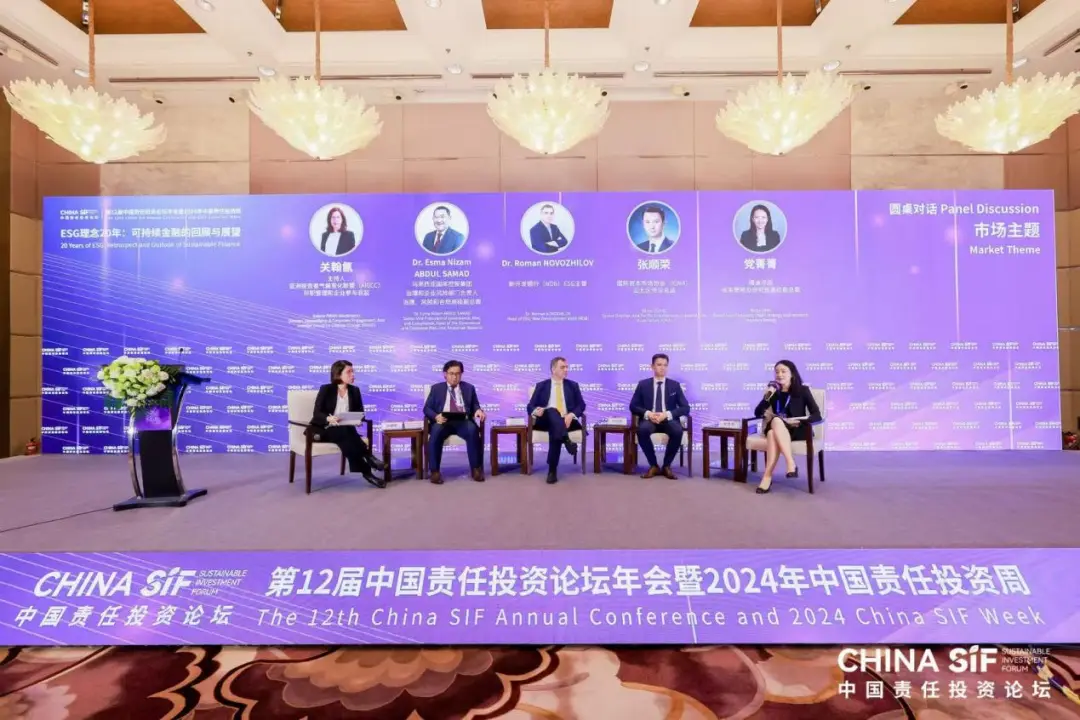
During the second release session, Professor ZHU Xufeng, Professor & Dean, School of Public Policy and Management, Executive Director, Institute for Sustainable Development Goals, Tsinghua University released the Research on the ESG Rating System of Provincial and Municipal Governments (2024). The report quantitatively rated the overall ESG performance of 31 provinces (including autonomous regions and municipalities) and 68 cities in China from 2017 to 2022. It found that the ESG performance of Chinese provinces and cities has shown a steady upward trend, with Guangdong Province and Beijing leading in ESG development. However, significant regional disparities remain, and there is considerable potential for improvement in urban ESG performance. The report recommends integrating ESG ratings into local government governance indicators and empowerment mechanisms, using ESG principles to enhance business environments and innovation capabilities. These findings provide valuable academic guidance for local governments in establishing sustainable development pathways centered on "green value." Ronssy XU, Head of Suzhou ESG Research Center, Deputy Director; Suzhou Industrial Park Urban Development Research Institute announced the launch of the Suzhou Industrial Park ESG Digital Platform. She highlighted the platform's innovation, providing enterprises with precise digital self-assessment tools to evaluate and enhance their ESG performance in stages. The platform promotes coordinated development by optimizing services, facilitating supply-demand connections, and advancing financial services. It aims to establish the ESG industry as a new economic growth driver in Suzhou Industrial Park, injecting fresh vitality into the regional economy.
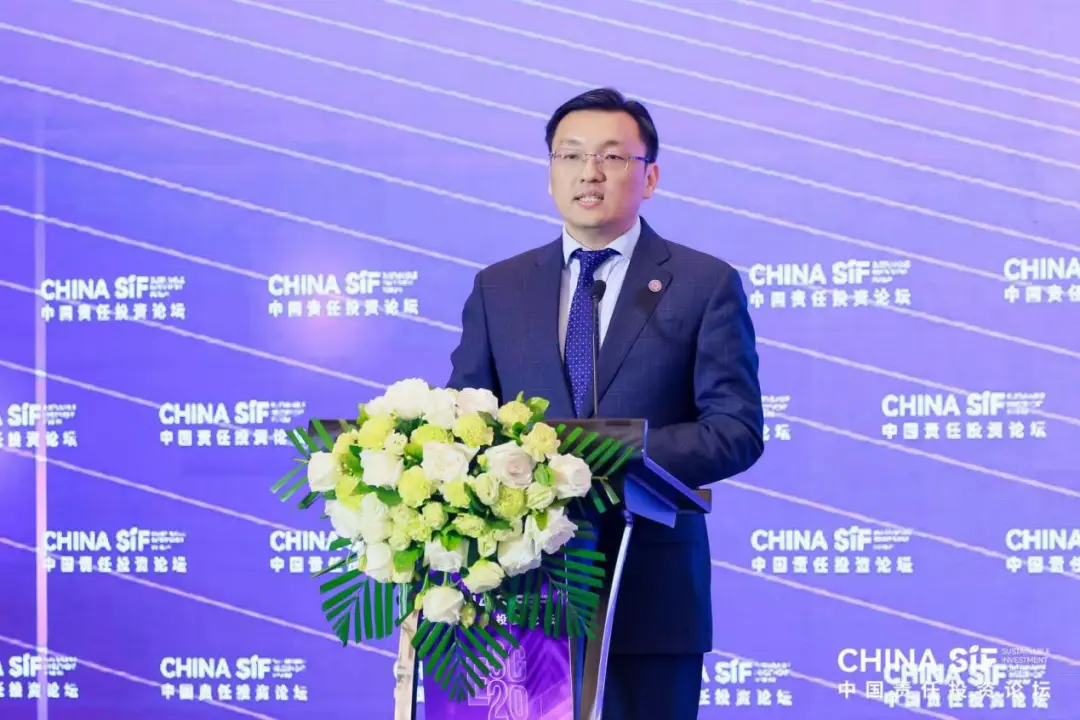
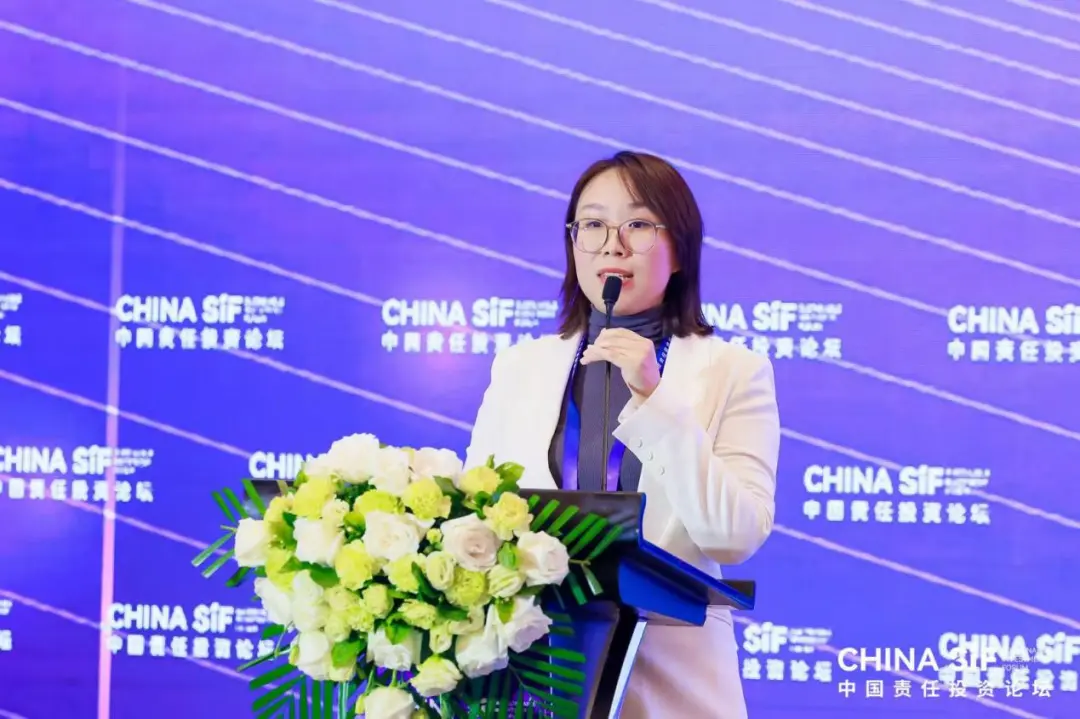
In the afternoon, four parallel forums were held on topics such as “ESG Investments for Transition Finance”, “Biodiversity and ESG Investments (TNFD Special)”, “Climate Resilience and Corporate Transition”, and “ESG Disclosure Standards Development”.
The parallel forum A1 on “ESG Investments for Transition Finance” was moderated by ZHU Ling, Country Lead of Capital Markets, CDP China. SPDB AXA Investment Managers' Deputy Director of International Business, YU Jin, said that achieving carbon peaking and carbon neutrality is a broad and profound systemic economic and social change that requires not only promoting the development of the green industry, but also driving the transformation of high-carbon industries towards low-carbon, and transition finance is indispensable. SPDB AXA Fund is willing to actively help and contribute at the investment end. Bank of Jiangsu's Team Manager of Green Finance Department, SUN Shuguang gave a keynote speech in which he analysed in depth how the Bank of Jiangsu has effectively helped companies achieve green transition and sustainable development goals by relying on a transition finance framework, an ESG rating system, risk management tools, and other measures to deeply integrate transition finance innovation into core business processes. Climate Bonds Initiative (CBI) co-founder and CEO Sean KIDNEY emphasized in his keynote speech the urgency of the global economy's transition towards greater climate resilience, low carbon and sustainability. He proposed that in order to achieve this goal, it is necessary to actively mobilize funds and capital, and further identify and develop climate investment and financing opportunities in various industries. China is also actively developing policy tools for transition finance, and has proposed transition principles or plans in 11 provinces. The Climate Bonds Initiative has begun to provide global capital markets with industry and corporate entity certification standards for transition finance, as well as a climate resilience taxonomy, providing clear guidance for market participants.
During the panel discussion, Cristina UNGUREANU, Research Affiliate, Genoa Center for Law and Finance; Chair, Global Governance Committee, International Corporate Governance Network (ICGN), Nana LI, Head of Sustainability & Stewardship, Asia-Pacific, Impax Asset Management, Grace Guan, Head of Amundi Responsible Investment China, Amundi Asset Management and Member of China SIF Board of Directors, and ZHANG Xiaohua, Senior Director of the ClimateWorks Foundation China, had an active discussion on the role of transition finance in helping traditional high-carbon industries achieve a low-carbon transition, as well as the market potential and scale of transition finance.
The parallel forum A2 on Biodiversity and ESG Investments (TNFD Special) was moderated by LENG Fei, Programme Manager, IKI-TNFD Programme, United Nations Development Programme (UNDP) in China. MA Chaode, Assistant Resident Representative, UNDP in China, Dr. GUO Peiyuan, Chairman of China SIF and Chairman of SynTao Green Finance; UNEP FI China Advisor, delivered opening remarks. Maxim VERGEICHIK, the senior economist of Nature Hub at UNDP, pointed out that in the past few years, our planet has sent us increasingly alarming signals, drought, water, scarcity, and devastating floods. Certainly, climate change is more visible, but we cannot miss the connectivity and unity of climate and nature systems and should put nature on equal terms with the discussions on climate. Thus, it is now time for economic actors, and the international community to work together, to realize these deep dependencies. He mentions that it is great to see China's leadership in some of the innovative approaches in sectors such as bioplastics or ecosystem restoration. The Nature Pledge by UNDP supports the implementation of the Kunming-Montreal Global Biodiversity Framework. UNDP and UNDP BIOFIN are facilitating nature investments in 132 countries and nature-related disclosure is one central pillow. Mr Vergeichik hopes that nature-related disclosure will become a driver for the progress in the activities related to nature-focused investment in China. Arild SKEDSMO, Senior Analyst of Responsible Investments at KLP Asset Management pointed out that deforestation, land conversion, pollution and overexploitation of natural resources are now threatening the basic life-supporting functions on the planet. This nature-crisis interacts with and exacerbates the climate crises. I look forward to discussing how industry and investors can work together to turn this challenge into opportunities for fair and sustainable welfare development. Romie GOEDICKE, Nature Co-Lead, United Nations Environment Programme Finance Initiative (UNEP FI) stated that UNEP FI is hosting the sustainable blue economy finance initiative, along with other sustainable finance principles. It aims to direct the flow of capital towards activities that contribute to SDG 14. She said, it's estimated globally, that nature-positive solutions can create an annual ten trillion in investment opportunities and close to four hundred million new jobs by 2030. The vast majority of these opportunities are in Asia. QIN Jun, Board Secretary and Chief Strategy Officer (CSO) of Muyuan Foods Co., Ltd. said that corporate innovation and development is the driving force behind social progress, and that harmonious coexistence is the cornerstone of sustainable development. The two are mutually reinforcing. Muyuan is committed to working with all sectors of society to build a more sustainable future. David Craig, the co-chair of TNFD, introduced that TNFD recommendations and guidance enable businesses and finance to integrate nature into their core decision-making processes, encouraging organizations to view nature as a strategic risk, management issue, and opportunity rather than corporate social responsibility. The transition to a nature-positive world will need to create tremendous opportunities for early movers and innovators. China is a key market for the TNFD due to its role as a major global economic power, its environmental challenge and growing interests, and developing expertise in sustainable finance and nature-based solutions. The TNFD looks forward to focusing its efforts on encouraging and supporting voluntary market adoption across China. XU Jin, National Consultant, IKI-TNFD Programme, UNDP in China moderated the panel discussion session, with Syngenta Group China ESG Assistant Director WANG Wenjuan, WANG Jun, General Manager, QHSE Department, Powerchina International Group Limited, Flora WANG, Director of Sustainable Investing, Fidelity International, Penny PENG, ESG Investment Manager, Asset Allocation Department, China Pacific Insurance (Group) Co., Ltd. GUO Yijin, Sustainable Investment Analyst, Manulife Investment Management, and HUANG Changtong, China Specialist, FAIRR Initiative. They exchanged views on how climate and nature can develop in tandem, focusing on biodiversity as an emerging hotspot. Special thanks to the IKI-TNFD project of the United Nations Development Programme for supporting this parallel forum.
Parallel Forum B1: Climate Resilience and Corporate Transition is moderated by Dr. Stan HO Ho-ming, Visiting Professor, School of Economics and Management, University of Hong Kong (HKU); Chief Representative, SynTao Green Finance International Limited. Katherine HAN, Head of ESG Research & Investment, Harvest Fund Management pointed out that the role of corporate ESG governance will become increasingly prominent in the context of a comprehensive green transformation of economic and social development. Investment institutions should use responsible management strategies to empower corporate green transition. WU Huanping, Director, System Development and Operation Office, National Climate Center pointed out that high-quality climate information disclosure and reporting will greatly contribute to corporate sustainable development. Currently, there is an urgent need for support from accurate and quantitative climate risk assessment models and high-resolution climate data sets. Therefore, interdisciplinary research and development in the fields of climate, economy, and information is of great importance. During the following release session, Secretary-General of China SIF and SynTao Green Finance Vice President Jonathan QIAN said that China Southern Fund and SynTao Green Finance have continued to cooperate on a series of climate risk research projects. The theme of the research report released this time is Research Report on Asset Management Industry Supporting Companies' Low-Carbon Transition. The aim is to establish a transition capability evaluation model based on the transition paths of different industries, and apply the analysis results to investment, so as to guide more capital to better support the low-carbon transition of the real economy. During the panel discussion, Charles NGUYEN, Managing Director, Head of ESG Asia, Neuberger Berman, Kazuma OSAKI, Asia-Pacific Policy Head, Principles for Responsible Investment (PRI), WU Xinghua, Deputy Director, Quality, Safety and Environmental Protection Department, China Three Gorges Renewables (Group) Co., Ltd., DENG Manshu, Hong Kong Chapter Lead, Glasgow Financial Alliance for Net Zero (GFANZ) actively shared their practical experience and innovative strategies in the process of green transition, and had an in-depth discussion on how companies can respond to the challenges posed by climate change and promote business transition by enhancing climate resilience.
Parallel Forum B2: ESG Disclosure Standards Development was moderated by Barney HUANG, Director, Regional Business, SynTao Green Finance. SynTao Consulting Beijing Office General Manager and Managing Partner PENG Jilai shared the latest development trends of domestic ESG policies in 2024, and pointed out that the three documents on sustainable development issued by the A-share market, namely the Guidelines, Guide and Working Guidelines, have already formed a complete and effective system for ESG information disclosure by listed companies. When dealing with increasingly stringent information disclosure requirements from internal and external stakeholders, companies need to fully understand and analyze the entire value chain process, deeply engage with internal stakeholders in the assessment of dual importance, correctly and comprehensively understand the definition of “impact”, and provide high-quality ESG data, in order to comprehensively manage sustainable development during corporate reform and transition. Christine LAU, Vice President, Listing Policy and Secretariat Services, Listing Division, Hong Kong Exchanges and Clearing Limited (HKEX), said in her keynote speech that HKEX’s new climate requirements are based on the ISSB standards, and serve to prepare issuers towards sustainability reporting in accordance with the local version of the standards when available. She added HKEX encourages issuers to consider early adoption and that reports prepared in accordance with the ISSB Standards will be considered to have complied with the HKEX new climate requirements. Fiona QUINLAN-WELLS, Training Officer, Sustainable Stock Exchanges (SSE) Academy, Kristy WONG, Head of Responsible Investment Specialists, Asia, HSBC Asset Management, WANG Xuan, Responsible Person of ESG & SD of Lenovo Group and Secretary General of ESG Committee of Lenovo China Site, Dr. LIU Yanfeng, Director, Corporate Governance, China Association for Public Companies (CAPCO), and Cayla LI, Member of Supervisory Board, Director of ESG Management and Sustainability Department, Sustainable officer, JA Solar discussed and shared their views on the global ESG information disclosure landscape and outlook.
We would like to thank our strategic partners Moody's, AXA SPDB Investment Managers, and partners Sungent Urban Development, Huatai Securities for their support of the 12th China SIF Annual Conference. The supporting organisations: include Bank of Jiangsu; SynTao Consulting; Beijing Enterprise Confederation; CDP China; Global Environmental Institute (GEI); Climate Bonds Initiative (CBI); FAIRR Initiative; Asia Investor Group on Climate Change (AIGCC). The media partners include Sina Finance; The Economic Observer; Caijing Magazine; Stockstar; China Fund News; Jiemian News; Weekly on Stocks; WallStreetCN; Caixin Global; NetEase Finance; Huxiu; qeubee LIVE; Wind 3C Conference; iFinD. China SIF received support from Shanghai Cailian Press; China Climate Engagement Initiative (CCEI); Sustainable Banking and Finance Network (SBFN); Beijing Credit Association; Institute of Finance and Sustainability (IFS); Principles for Responsible Investment (PRI); Aegon Industrial Fund; Yuze Charity; Gems of Wisdom Consulting; BNP Paribas ABC Wealth; CCM CSR Promotion Centre; School of Management and Economics, Chinese University of Hong Kong, Shenzhen; CUEB China ESG Institute; Shenzhen Finance Institute, etc. We extend our heartfelt thanks for their support.
The 12th China SIF Annual Conference serves as the flagship event of the 2024 China SIF Week. Additionally, China SIF Week comprises 9 side events, encompassing a wide range of topics. as The 6th Media Training Workshop on ESG & Green Finance: Capital Market Trends under Green and Low-Carbon Transition, Academic Workshop on ESG, Sustainable Stock Exchange Roundtable (SSER), Seminar on Climate Mitigation Journey and Transition for Financial Institutions, Unlocking Potential Climate Investment: Transition Opportunities in the Energy and Agriculture Sectors, Seminar on ESG Vitality and Impact Investment and Financing: Sustainable Disclosure for Better Business Impact Investment and Financing Development, CCEI Just Transition Seminar Session 3: Just Transition Consideration for Different Sectors and Geographies, China Climate Engagement Initiative (CCEI) Enterprise Visit, and more. Furthermore, China SIF Week also organised working meetings for domestic and international organizations such as CCEI, AIGCC.
Please feel free to follow the China SIF WeChat official account (ChinaSIF), as well as the official account of the organizer, SynTao Green Finance (syntaogf).
For inquiries regarding cooperation intentions with China SIF or requests for information, please contact the organizer at: contact@syntaogf.com.
About China SIF
China Sustainable Investment Forum (China SIF), established in Beijing as a non-profit organisation in 2012, is dedicated to promoting responsible investment and providing an internationalised platform for exchanging and sharing ideas on issues concerning sustainable development, with focus on facilitating Environmental, Social and Governance (ESG) integration, advocating green finance, and contributing to a responsible capital market in China as well as its sustainability.
As a member of the Global SIFs Network, China SIF organises Annual Conferences, Summer Summits, SIF Weeks and a series of featured seminars and webinars annually, convening policymakers as well as domestic and foreign experts to share their views, research, and good practice. Professionals and practitioners from research institutes, financial institutions, listed companies, government agencies, and media representatives have joined our discussion and endeavour to explore multiple ways to promote and practice responsible investment and green finance.
China SIF keeps launching a series of landmark research reports, such as China Sustainable Investment Review, supporting the Dissertation Competition on ESG and Sustainable Finance and developing the "ESG Online Classes" series of educational videos together with partners and industry experts to promote ESG investment concepts and practices. Over the years, China SIF has become one of the most influential responsible investment forums in the region.
Please visit https://en.chinasif.org/ for more information.



































